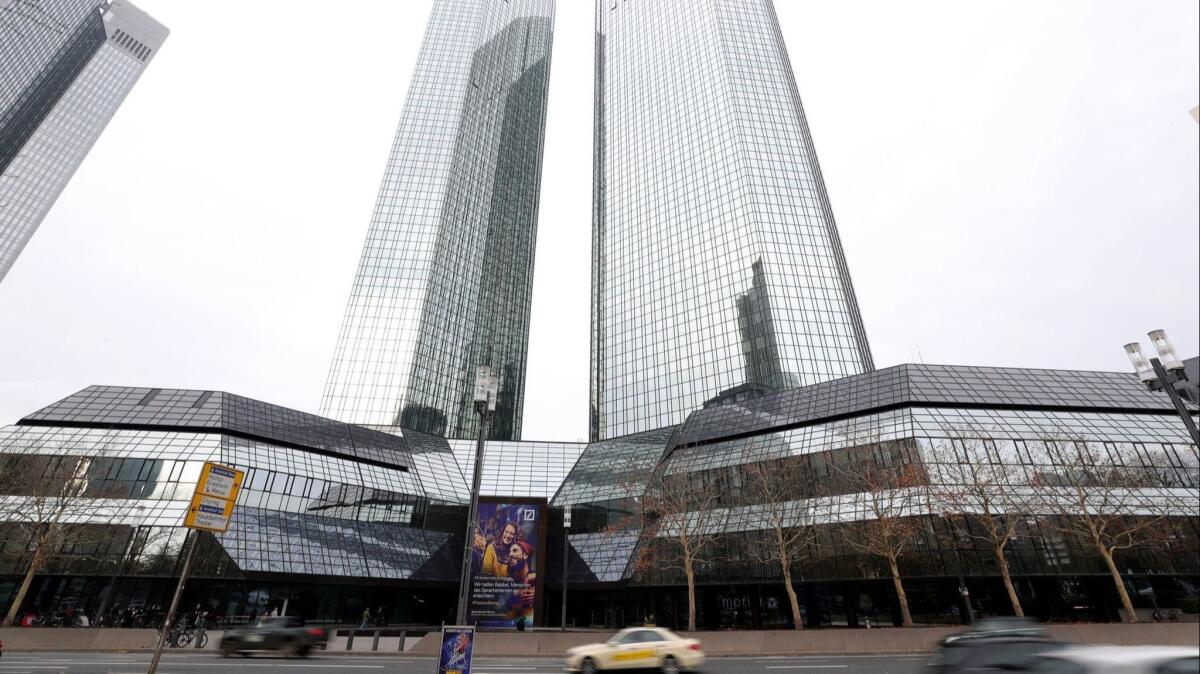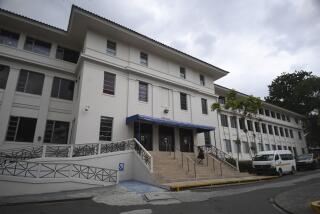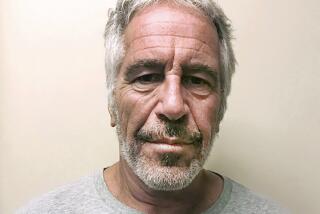Deutsche Bank offices in Germany raided by authorities over alleged money laundering

- Share via
German authorities raided the Frankfurt headquarters of Deutsche Bank on Thursday in connection with money-laundering allegations first revealed two years ago in the so-called Panama Papers. But the activities that prompted the police raid extended into this year, according to authorities.
The main suspects in the probe, focused on a unit in the British Virgin Islands that processed $354 million in 2016 alone, were two bank employees identified by their ages — 50 and 46, including one who works in the anti-financial crime office. The investigation covers the five-year period from 2013 to 2018, a spokeswoman for Frankfurt prosecutors said.
For the beleaguered German lender, the raid adds to a panoply of headaches — commercial, regulatory and legal — facing Chief Executive Christian Sewing, who took over in April, and Paul Achleitner, chairman since 2012.
Chief among them is its role as a correspondent bank in a separate $230-billion money-laundering scandal focused on Denmark’s largest bank, Danske. Authorities said Thursday’s raid was unrelated to Danske, sending Deutsche Bank’s stock down 3%. Shares have now almost lost half their value this year.
“This must be associated with criminal behavior and not just a trivial offense,” said Stefan Mueller, chief executive of DGWA, an investment advisory boutique based in Frankfurt. He believes the bank will now be paralyzed for months until it becomes clear how it will be affected by new potential fines.
The Panama Papers refer to a collection of documents leaked in 2016 from Mossack Fonseca, a Panama-based law firm that created shell companies to facilitate tax avoidance. At the time, Deutsche Bank severed ties with a Cypriot lender partly owned by VTB Group that was identified in the reporting.
Subsequent investigations exposed evidence that Deutsche Bank helped clients set up off-shore accounts, prosecutors said. Authorities seized documents and electronic files after more than six police vehicles, blue lights flashing, pulled up to Deutsche Bank’s main offices shortly before 9 a.m., in an operation involving about 170 officers. The home of one of the suspects was also searched.
The German lender may have helped clients in setting up offshore companies in tax havens. Money obtained illegally may have been transferred to accounts at Deutsche Bank, which failed to report the suspicions that the accounts may have been used to launder money, Frankfurt prosecutors said.
A Deutsche Bank spokesman said the bank had been cooperating with prosecutors.
“As far as we are concerned, we had already provided the authorities with all the relevant information regarding the Panama Papers,” spokesman Joerg Eigendorf told reporters in Frankfurt.
The timing of the raid inflicts more pain on Deutsche Bank after a series of setbacks and repeated failures in keeping misconduct in check have pushed the shares to all-time lows. Germany’s markets regulator has even taken the unprecedented step of appointing a monitor to oversee the firm’s efforts to improve money-laundering and terrorism-financing controls.
Deutsche Bank has spent more than $18 billion paying fines and settling legal disputes since the start of 2008, according to company disclosures compiled by Bloomberg News. In Europe, Royal Bank of Scotland Group Plc is the only lender to have faced a bigger tab, at $18.1 billion, the calculations show.
“Just when you thought Deutsche Bank had left its legal troubles behind it, there’s more,” said Markus Riesselmann, an analyst at Independent Research who recommends investors sell Deutsche Bank shares. “Investors really want to be able to focus on the bank’s operating business, so this noise around them is quite unhelpful for the mood.”
Sewing, who took the top job in April, is replacing key executives as part of a management shakeup as he struggles to get Germany’s biggest lender back on track. Sylvie Matherat, a management board member who serves as the bank’s chief regulatory officer, and Tom Patrick, who runs operations in the Americas, are among executives who might ultimately leave, people familiar with the matter said this week.
In a June 2017 interview, Matherat described the monumental task of modernizing the company’s compliance methods. After years of acquisitions and overseas expansion, the lender was left with a patchwork of computer programs to monitor transactions. The bank didn’t have a complete picture of the compliance controls in the organization’s businesses and regions, she said.
“I hate surprises, but you don’t know what you don’t know,” said Matherat, a lawyer and former deputy director general at the French central bank.
Matussek, Comfort and Arons write for Bloomberg.
UPDATES:
1:10 p.m.: This article was updated with a Bloomberg wire article.
This article was first published at 7:40 a.m.
More to Read
Inside the business of entertainment
The Wide Shot brings you news, analysis and insights on everything from streaming wars to production — and what it all means for the future.
You may occasionally receive promotional content from the Los Angeles Times.










